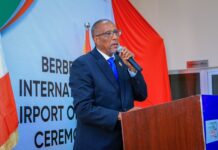NAIROBI: Aden Barre Duale, the Garissa Township MP, is probably the most outspoken Somali politician Kenyans have seen in recent times. He has been accused of many things including sycophancy and going to any length to defend the Jubilee government. He is loathed and loved in equal measure.As the Leader of the Majority party in the National Assembly, Mr Duale ensures his party MPs toe the party line. That simply means ensuring discipline and order in Parliament.
So far, very few government-sponsored Bills have been defeated in the House. That is commendable given the fractious nature of coalition politics where for reasons other than the party’s, MPs often rebel or countermand the Leader.
Duale has also managed to lure many Opposition MPs to his side, to the advantage of the Government. He wears many hats. But it is for the first role rather than the second that he is loathed.
As a leader of one of Kenya’s minority tribes, many would have expected Mr Duale to first remove the log in his eye. For many years, the Somali community in Kenya has felt like second-class citizens. And therefore, many think, he ought to be at the forefront “bringing development” to his people.
One would understand Mr Duale’s dilemma: Does he strive to execute the first role or the second role, which gave him the first job? There is a reason he behaves that way.
For many years, the leaders who represented the northern parts of Kenya were timid and felt insecure. It is easy to understand why.
When in the 1980s fiery Butere MP Martin Shikuku declared in Parliament that Northern Kenya was only inhabited by camels and wildlife and hence there was little need for large-scale investments by the Government, not a single Somali MP dared respond to Mr Shikuku. Not much was expected of them anyway. Across the region, there was a general feeling of not being part of Kenya. The elected leaders also just reflected the same feeling.
Many years of repression especially during the Shifta wars and the subsequent periods created suspicion that the Somalis were disloyal to the Republic. Dissent and rumbling was stamped out mercilessly.
The massacre at Wagalla in Wajir and death of many civilians in Garissa and others part of northern Kenya created a feeling of fear and isolation for the people living in those areas. Nowhere else in the country has the Preservation of Public Security Act been used to vilify a population. Even elected leaders felt intimidated. In truth, the people of Northern Kenya have had their fair share of troubles to as recently as when terrorists literally strolled across the border and carried out massacres.
The worst of all was the massacre at Garissa University. That attack, and many others, took the region back nearly 10 years. The exodus has been unrelenting. Schools and hospitals and public offices have been deserted.
But now is the time to turn a new leaf. And to do that, we need a champion. Since the advent of multi-party politics, the game has slowly but surely changed. A new chapter is being written. Young leaders from the region have started to shed the stigma and many now contribute to the national debate with great confidence.
That can be seen even outside Parliament where the likes of Ahmednasir Abdulahi, popularly referred to as the Grand Mullah, have shown that the crop of Somalis in positions of influence no longer feel like they are outsiders.
Without fear, many of these young leaders are now reflecting and participating in national discussions. Others like Mandera Senator Billow Kerrow are not shy to put the Somali agenda on the national headlines.
This outspokenness has a therapeutic effect for the Somali community in the country. It is understandable that many within the Somali elite at times feel uncomfortable with this brand of “young Turks”. I guess the controversial remarks are meant to make up for the lost years. That is expected.
The people from the Northern parts of the country, not only the Somali, but the entire Cushitic groups need a united purpose to further the agenda for development.
I am a unitarist: I believe that the whole is made up of the sums of the pieces. I believe perfect building blocks make up a better and strong structure. A perfect North Eastern Kenya is good for Kenya and the region. I see in other parts of the country communities have joined hands and easily negotiate for power or access to national resources. In the North, this has not been possible. Clan politics still reigns supreme.
This is where I see Mr Duale’s role especially because he is within earshot of the President. He therefore needs to consolidate his position by uniting the people behind a common cause. No doubt, he enjoys great goodwill from the communities in the region.
The development of the northern part of Kenya depends to a larger extent on the unity of purpose of its leaders. Mr Duale can start to assume that role and become the de facto leader of the region. He should, as a start, rally the people around the common cause of insecurity and poverty alleviation.
Source: Standard Digital






















